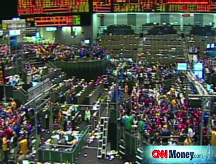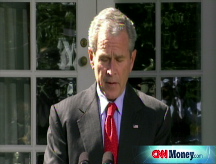Bailout: Not popular but the right call
The House joined the Senate in approving the bank bailout plan Friday. Even though many taxpayers are still angry, the rescue plan was necessary.
NEW YORK (CNNMoney.com) -- The bailout drama is over. Now it's time to move on and hope that it actually works.
I realize that the passage of the bank rescue plan by the House Friday is not popular with many readers. But this was necessary. Cooler heads prevailed.
"I'm glad that Congress finally saw the light. This was a time when pragmatism had to trump ideology," said David Joy, chief market strategist with Minneapolis-based RiverSource Investments.
Yes, this will not solve the banking and credit crisis overnight.
Yes, companies that are guilty of, at the very least greed and gross incompetence, are getting a lifeline.
Yes, the bailout was "sweetened," which is a nicer way of saying it was loaded up with pork to ensure it received bipartisan support.
And yes, the government is risking $700 billion of taxpayer money, hoping to buy distressed mortgage securities on the cheap and to sell them for a higher price later.
However, despite all these concerns, passing the bailout is a huge step in the right direction.
"Credit will still be tight but not as tight if there was no bailout," said Sean Snaith, an economics professor at the University of Central Florida. "We still have a ways to go to get us out of the woods but this at least puts a GPS in our hands."
Stocks, which were trading substantially higher before the vote, pulled back after the vote and finished sharply lower Friday.
One investment strategist said that investors were expecting the bailout to be approved so he was not surprised by the pullback. He added that investors are now starting to wonder just how effective the bailout will be.
"This is a classic case of buy on the rumor and sell on the news," said Doug Roberts, chief investment strategist with ChannelCapitalResearch.com, an investment research firm based in Shrewsbury, N.J.
"This was a necessary step but it is still just a step. This is the first thing that needs to be done but the bailout is not a silver bullet to solve all our economic problems," Roberts added.
Joy agreed and added that Americans will have to be patient. The bailout may prevent the economy from getting significantly worse but does not fix the issues in the housing or labor markets.
The government reported that nearly 160,000 jobs were lost in September, a sobering reminder of just how weak the economy is.
"We may not be staring into the abyss anymore but the economy is still not looking all that great," Joy said.
I recognize that the bailout does not sit well with many taxpayers. As I've stressed repeatedly in the past few weeks, I'm not happy that the government had to do this either.
But if the bailout keeps some banks in business and hard-working Americans in the financial-services industry from losing their jobs, isn't that a good thing?
Of course, the top executives of the banks and Wall Street firms most responsible for this mess should not get any golden parachutes. What's more, if any of them are found to be guilty of outright fraud, they should be punished.
But should entire companies, many of which have workers who had nothing to do with the crisis, be penalized?
Remember the accounting scandal that brought down Enron and WorldCom? I'm happy that the senior executives of those firms were sentenced to jail, but looking back, should we really have cheered the complete demise of the companies given the loss of so many jobs and the evaporation of retirement savings of average workers?
I understand the desire for retribution here. But I don't get why anyone would actively root for more severe economic pain just to teach wealthy bankers a lesson.
The lack of a bailout would have caused more chaos in the banking industry. And that would eventually hurt everybody even though many people don't seem to want to believe that.
"The biggest problem with the bill was that the government did a poor job selling how this affects the average American," said Snaith. "Without question, letting this abscess fester would have sent an already teetering economy into a much deeper and longer recession." ![]()




